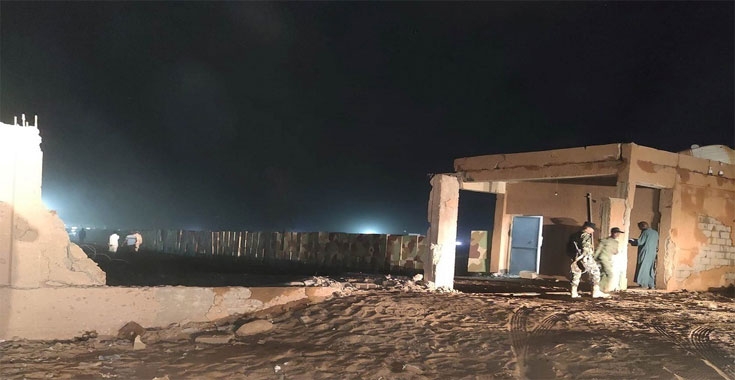The targeting of the “ Um el Araneb” military camp in southern Libya is consistent with the pattern of ISIS attacks in the past, and is related to fragile security in southern Libya and instability in neighboring countries, which creates an environment conducive for organized crime and terrorist organizations. Political divisions among the major actors in Libya also enhances the atmosphere of instability, making it easier for ISIS to conduct its operations. ISIS is particularly hostility towards the “Tarek bin Ziad’ battalion, affiliated to Haftar’s army , and has recently acquired significant capabilities, such as the ability to use remotely detonated car bombs, and to plant mines on roadsides. It is important to note here that ISIS’s foothold in Libya is central to the organization’s command of the North African region.
On the 19th of April, the Libyan National Army (LNA) announced that ISIS deployed a car bomb at its base south-east of Sabha, that destroyed the camp gate and caused numerous injuries to security personnel. ISIS took responsibility for the attack, declaring it was in revenge for the killing of two of its members by the LNA during a previous attack on the same camp in September 2020. A that time, the LNA launched several operations in Fezzan, killing the ISIS’s leader in North Africa Abu Moaz al-Iraqi. The LNA has also expanded its operations to target the triangular borders with Chad and the Niger.
This latest attack on a military installation illustrates a number of important factors regarding security conditions in Libya and the current strength of ISIS in this country, including:
The fragile security situation in southern Libya: ISIS presence in the south expanded after the Battle of Tripoli came to an end, and the ceasefire between the LNA and Western Libyan forces. ISIS return to activity in Libya is in the context of enhanced activity in the Sahel region as a whole. It seeks to exploit the LNA’s limited military deployment in the southern regions of Libya, where it relies on an alliance with the local tribes. The LNA has attempted to support a reconciliation process between the Tubu and Tuareg tribes in order to enhance security, as well as engaging with border states to ensure better control of the borders. However, the success of this engagement remains limited, in the light of tensions in Darfur, west of Sudan, as well as in Chad, where rebel groups assemble against the Mahamat Déby regime, as well as instability in Niger and Mali. In view of weak security arrangements in southern Libya, organized crime is active in arms smuggling, illegal migration and other activities. UN reports suggest that these groups have formed an alliance based on mutual interests.
ISIS hostility to the LNA: ISIS indicated in its statement that it had deliberately targeted a camp under General Haftar’s command, as it is hostile to LNA forces. It is worth noting that there is a presence of security forces affiliated to Dbeibeh forces in the southern areas of Libya, but ISIS has not attacked them. ISIS’s particular hostility to the Tarek bin Ziad battalion is due to its enmity towards Saddam Haftar, more than any other Libyan figure, as well as avenging its expulsion from the rich area of the “oil crescent”. This particular battalion is also in control of oil resources in the south, including one of Libya’s largest oil fields.
Political divisions undermining security: Many have pointed out the link between discord among the various Libyan factions and weak security conditions in the country. Financial constraints have been imposed on the LNA by the government of Abdul Hamid Dbeibeh, which prevents stepping up conscription of more troops. The arms embargo on the LNA prevents the development of defense capabilities. Libya’s domestic divisions, as well as instability in neighboring countries, have provided a window of opportunity for terrorist organizations and organized crime.
Significant developments in ISIS capabilities: ISIS operations in the south of the country demonstrate the organization has achieved a qualitative improvement in its capabilities. ISIS now has the ability to remotely detonate car bombs, as well as plant and remotely detonate mines on roadsides. These abilities are believed to have been acquired from ISIS elements with experience in Iraq, the homeland of the organization’s leadership including Abdulaziz al-Anbari, the organization’s first leader in command, and his successor Abu Moaz al-Iraqi.
Libya’s centrality in ISIS’s regional leadership: ISIS capabilities evolved in the wake of the organization’s takeover of Boko Haram after Al Qaeda’s defeat. Amid prospects of transitioning North African leadership to Libya. This is indicated by LNA references to ISIS leaders killed in action as the leaders of ISIS North Africa. On the local level, ISIS in Libya is led by Abu Abdallah al-Libi, a commander who was believed to have been killed by the LNA in the September 2020 operation, but it was later discovered that the deceased was Iraqi commander Abu Moaz.
In conclusion, it can be argued that this latest attack by ISIS in southern Libya is the predictable means by which ISIS seeks to affirm its presence in that area and launch a war of attrition against the LNA, which is its main opponent there. The LNA will need to strengthen its capabilities, training and deploying additional forces in the south to better control the country’s expansive borders. Libya’s southern borders are of special concern after France’s withdrawal from Mali, and the assassination of Chad’s president, Idriss Déby. Despite the massive proliferation of weapons among militias and terrorist organizations in Libya, the arms embargo on the LNA, combined with limited military expenditure, and Libya’s political divisions continue to undermine its fight against terrorism.


